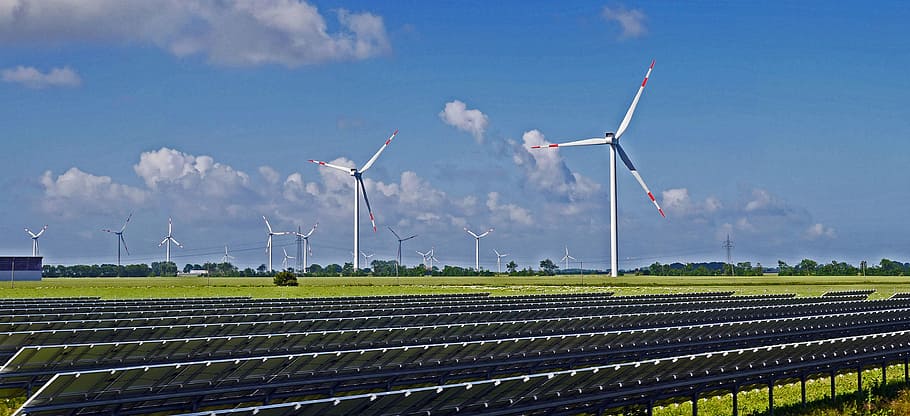FOR IMMEDIATE RELEASE
January 25, 2021
Energy Resilient Communities Act was reintroduced today
Washington, D.C. – Today, Congresswomen Nanette Diaz Barragán and Yvette D. Clarke reintroduced a bill to create the first federal program to build 100-percent clean energy microgrids to power critical infrastructure for communities in the aftermath of an extreme weather event or power shut-off.
The Energy Resilient Communities Act prioritizes energy equity and environmental justice by putting grant applications from low-income communities and communities of color at the front of the line for clean energy microgrid grants that will help combat power outages and rolling blackouts, reduce pollution, create green jobs, and fight the climate crisis.
“As the climate crisis worsens, our country is experiencing unprecedented wildfires, hurricanes, floods, and heat waves – often creating power outages. We experienced this in Los Angeles and throughout California in September when record heat waves created a state of emergency and caused tens of thousands of Southern California residents to lose power. Keeping the lights on and maintaining health care and emergency services can be the difference between life or death. The Energy Resilient Communities Act will help communities recover from extreme weather events by centering our most vulnerable communities at the heart of the clean energy revolution,” Congresswoman Barragán said.
“I’m proud to be introducing the Energy Resilient Communities Act along with Congresswoman Barragán, which will support resilient and equitable clean energy systems across the nation while also growing clean energy jobs,” said Congresswoman Clarke, D-N.Y. “From Superstorm Sandy to summer heat waves, Brooklynites are all too familiar with the impacts of extreme weather on our communities and critical infrastructure. Unfortunately, we know that the climate crisis is only making these types of impacts more frequent and severe, particularly for those areas that have seen the greatest climate and pollution impacts yet received the least in renewable energy investment. Through the federal programs established by this legislation, local communities will have access to unparalleled grant funding and technical assistance to develop zero-emission microgrids that will simultaneously tackle the climate crisis while fortifying our essential services and infrastructure to the impacts of future climate disasters.”
In addition to the bill’s importance for maintaining power to critical facilities such as hospitals, fire stations, schools, grocery stores, senior and public housing, the Energy Resilient Communities Act will help our country fight the climate crisis and reduce air pollution. In 2019, 546 microgrids were installed in the United States. Of these, 86 percent were powered, at least in part, by burning fossil fuels. The legislation will support the construction of hundreds of microgrids annually powered by 100 percent clean energy.
In the absence of microgrids, communities often rely on diesel-powered generators, which heavily pollute the air and are dangerous if used improperly. More than half of the deaths associated with Hurricane Laura were caused by the use of portable generators.
Energy Resilient Communities Act Highlights:
- Authorizes $50 million in annual grants for technical assistance and $1.5 billion in annual grants for clean energy microgrids to support the critical infrastructure needed in the aftermath of an extreme weather event.
- A minimum of $150 million of annual authorized funding is reserved for grants supporting the construction of community-owned energy systems.
- State and local governments, territories, political subdivisions of the state, tribal agencies, utilities, and non-profits can apply for grants.
- Grants are prioritized for applications from environmental justice communities.
- Examples of critical infrastructure include hospitals, grocery stores, community centers, public safety facilities, water systems, public or affordable housing, medical baseline customers, and senior housing.
- Projects are additionally prioritized based on several criteria, including how effectively they reduce pollution and improve public health, whether they are built on previously disturbed land, whether they include contracts for women and minority owned businesses, their utilization of apprenticeships, and whether the proposed project will be a community-owned energy system.
- The maximum federal cost share of 60%, except for environmental justice communities, where the maximum federal cost share is 90%.
- Includes Buy American provisions to maximize the creation of American manufacturing jobs in the production of materials and technology for microgrids.
- There are worker hiring targets for each project to maximize the number of local and economically disadvantaged workers, including those who live in environmental justice communities or were displaced from a previous job in the energy sector.
The full bill can be found here.
Barragán and Clarke were joined by 39 original cosponsors of the Energy Resilient Communities Act, including Congressmembers Albio B. Sires (N.J.), Adriano Espaillat (N.Y.), Gwen Moore (Wis.), Earl Blumenauer (Oreg.) Jan Schakowsky (Ill.), Al Lawson (Fla.), Eleanor Holmes Norton (D.C.), Ro Khanna (Calif.), Jahana Hayes (Conn.), Alcee L. Hastings (Fla.), Paul D. Tonko (N.Y.), Jared Huffman (Calif.), Nydia Velázquez (N.Y.), Chellie Pingree (Maine), Jerrold Nadler (N.Y.), Tom Suozzi (N.Y.), Grace Meng (N.Y.), Peter Welch (VT), Chrissy Houlahan (Penn.), Mikie Sherrill (N.J.), Bill Foster (Ill.), Mike Doyle (Penn.), Carolyn B. Maloney (N.Y.), Bennie Thompson (Miss.), Kathy Castor (Fla.), Bonnie Watson Coleman (N.J.), Emmanuel Cleaver (Missouri), Cori Bush (Missouri), André Carson (Indiana), Doris Matsui (Calif.), and Rashida Tlaib (Mich.), Jesús G. “Chuy” García (Ill.), Jerry McNerney (Calif.), Alexandria Ocasio-Cortez (N.Y.), Adam Smith (Wash.), Tony Cardenas (Calif.), Jamaal Bowman (N.Y.), Andy Kim (N.J.) and Mondaire Jones (N.Y.).
The Energy Resilient Communities Act is supported by Sierra Club, 350.org, National Wildlife Federation, Earthjustice, Friends of the Earth, Food & Water Action, Mothers Out Front, Green for All, Eastyard Communities for Environmental Justice, Center for Earth, Energy, and Democracy (CEED), The Center for Biological Diversity, Greenpeace, League of Conservation Voters, Hispanic Access Foundation, San Diego 350, Hispanic Access Foundation, San Diego 350, Union of Concerned Scientists, Environmental Defense Fund, and GreenLatinos.
###
Nanette Diaz Barragán is proud to represent California’s 44th Congressional District, which includes the communities of Carson, Compton, Florence-Firestone, Lynwood, North Long Beach, Rancho Dominguez, San Pedro, South Gate, Walnut Park, Watts, Willowbrook and Wilmington.

